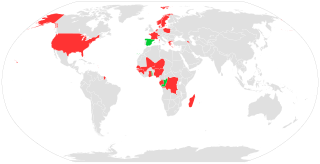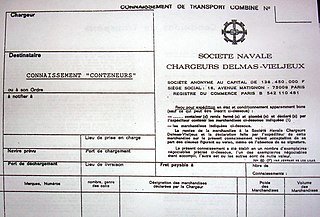Related Research Articles
Protection and indemnity insurance, more commonly known as P&I insurance, is a form of mutual maritime insurance provided by a P&I club. Whereas a marine insurance company provides "hull and machinery" cover for shipowners, and cargo cover for cargo owners, a P&I club provides cover for open-ended risks that traditional insurers are reluctant to insure. Typical P&I cover includes: a carrier's third-party risks for damage caused to cargo during carriage; war risks; and risks of environmental damage such as oil spills and pollution. In the UK, both traditional underwriters and P&I clubs are subject to the Marine Insurance Act 1906.
In a contract of carriage, the consignee is the entity who is financially responsible for the receipt of a shipment. Generally, but not always, the consignee is the same as the receiver.
A charterparty is a maritime contract between a shipowner and a "charterer" for the hire of either a ship for the carriage of passengers or cargo, or a yacht for pleasure purposes.
The Carriage of Goods by Sea Act ("COGSA") is a United States statute governing the rights and responsibilities between shippers of cargo and ship-owners regarding ocean shipments to and from the United States. It is the U.S. enactment of the International Convention Regarding Bills of Lading, commonly known as the "Hague Rules". It was found in Title 46 Appendix of the United States Code, starting at Section 1301, but has been moved to a note in 46 United States Code 30701.
An air waybill (AWB) or air consignment note is a receipt issued by an international airline for goods and an evidence of the contract of carriage. It is not a document of title to the goods. The air waybill is non-negotiable.

New Zealand Shipping Co. Ltd. v. A. M. Satterthwaite & Co. Ltd., or The Eurymedon is a leading case on contract law by the Judicial Committee of the Privy Council. This 1974 case establishes the conditions when a third party may seek the protection of an exclusion clause in a contract between two parties.
The Hague–Visby Rules is a set of international rules for the international carriage of goods by sea. They are a slightly updated version of the original Hague Rules which were drafted in Brussels in 1924.
The Hague Rules of 1924 is an international convention to impose minimum standards upon commercial carriers of goods by sea. Previously, only the common law provided protection to cargo-owners; but the Hague Rules should not be seen as a "consumers' charter" for shippers because the 1924 Convention actually favoured carriers and reduced their obligations to shippers.
The Hamburg Rules are a set of rules governing the international shipment of goods, resulting from the United Nations International Convention on the Carriage of Goods by Sea adopted in Hamburg on 31 March 1978. The Convention was an attempt to form a uniform legal base for the transportation of goods on oceangoing ships. A driving force behind the convention was the attempt by developing countries' to provide all participants a fair and equal chance of succeeding. It came into force on 1 November 1992.
Affreightment is a legal term relating to shipping.
The Uniform Bills of Lading Act was adopted in 1909 and passed by the US Uniform Law Commission. The act addressed the judicial and legislative treatment of issues such as the extent of the carrier's liability to the consignee of the goods or to the buyer of the bill of lading based upon the carrier's issuance of the bill. It governed the relationship between persons with interest in the goods, and carriers who transported those goods. It set / described how a carrier could limit its liability.

The "Rotterdam Rules" is a treaty proposing new international rules to revise the legal framework for maritime affreightment and carriage of goods by sea. The Rules primarily address the legal relationship between carriers and cargo-owners.

The doctrine of deviation is a particular aspect of contracts of carriage of goods by sea. A deviation is a departure from the "agreed route" or the "usual route", and it can amount to a serious breach of contract.

The Carriage of Goods By Sea Act 1992 is a UK Statute regarding bills for the lading of goods onto ships. It repealed the Bills of Lading Act 1855 and made new provisions.

A bill of lading is a document issued by a carrier to acknowledge receipt of cargo for shipment. Although the term historically related only to carriage by sea, a bill of lading may today be used for any type of carriage of goods. Bills of lading are one of three crucial documents used in international trade to ensure that exporters receive payment and importers receive the merchandise. The other two documents are a policy of insurance and an invoice. Whereas a bill of lading is negotiable, both a policy and an invoice are assignable. In international trade outside the United States, bills of lading are distinct from waybills in that the latter are not transferable and do not confer title. Nevertheless, the UK Carriage of Goods by Sea Act 1992 grants "all rights of suit under the contract of carriage" to the lawful holder of a bill of lading, or to the consignee under a sea waybill or a ship's delivery order.
A freight claim or cargo claim is a legal demand by a shipper or consignee against a carrier in respect of damage to a shipment, or loss thereof.
Seaworthiness is a concept that runs through maritime law in at least four contractual relationships. In a marine insurance voyage policy, the assured warrants that the vessel is seaworthy. A carrier of goods by sea owes a duty to a shipper of cargo that the vessel is seaworthy at the start of the voyage. A shipowner warrants to a charterer that the vessel under charter is seaworthy; and similarly, a shipbuilder warrants that the vessel under construction will be seaworthy.

The Carriage of Goods by Sea Act 1971 is a United Kingdom Act of Parliament. It incorporates into English Law the Hague-Visby Rules which are to be found as the Schedule to the Act. The Act does not use the term "Hague-Visby Rules" as such; instead, the Rules are referred to in that Act as the "Hague Rules As Amended".
Grant v Norway (1851) is a case on the Law of Carriage of Goods by Sea; but since 1992 it has no longer been good law.

Leduc v Ward is a leading English case on deviation within the law of carriage of goods by sea. The case also addresses bills of lading, and the parol evidence rule.
References
- ↑ The Law of Carriage of Goods by Sea (2011) - L.Singh
- ↑ Hague-Visby Rules Art III rule 2.
- ↑ M’Andrew v Adams (1834) 1 Bing NC 29
- ↑ Glynn v Margetson
- ↑ Hague-Visby Rules Art IV rule 4.
- ↑ Bill of lading, or sea way bill or ship's delivery order: Carriage of Goods by Sea Act 1992 ss.1 & 2
- ↑ Sale of Goods Act1979 (as amended), section 12
- ↑ Sale of Goods Act1979 (as amended), section 14
- ↑ Sale of Goods Act1979 (as amended), section 15
- ↑ Sale of Goods Act1979 (as amended), section 13
- ↑ Hague Visby Rules Art. IV Rule 2(n)
- ↑ Goodwin v Lamport and Holt [1929] All ER 623
- ↑ Hague Visby Rules Art. III
- ↑ Parsons v New Zealand Shipping [1901] KB 548
- ↑ Bunge v Brasil [2009] 2 Lloyds Rep 175
- ↑ Hague-Visby Rules Arts. II & III
- ↑ Hague-Visby Rules Art IV
- ↑ The Teutonia (1872) LR 4 PC 171
- ↑ The Al Taha [1990] 2 LL R 117
- ↑ Stag Line v Foscolo, Mango & Co [1932] AC 328
- ↑ Scaramanga v Stamp (1880) 5 CPD 295
- ↑ Maredelanto Compania Naviera SA v Bergbau-Handel GmbH|The Mihalis Angelos
- ↑ M'Andrew v Adams (1834) 1 Bing NC 29
- ↑ ...such as "Act of God", "Perils of the Sea" and "negligence in navigation or management of the ship").
- ↑ e.g. Hague-Visby Rules Art. IV (1) & (2)
- ↑ Principles of the Carriage of Goods by Sea -Paul Todd
- ↑ The Glenfruin (1885) 10 PD 103
- ↑ McFadden v Blue Star Line [1905] 1 KB 697
- ↑ UNCITRAL: United Nations Commission of International Trade Law.
- ↑ Lexology report